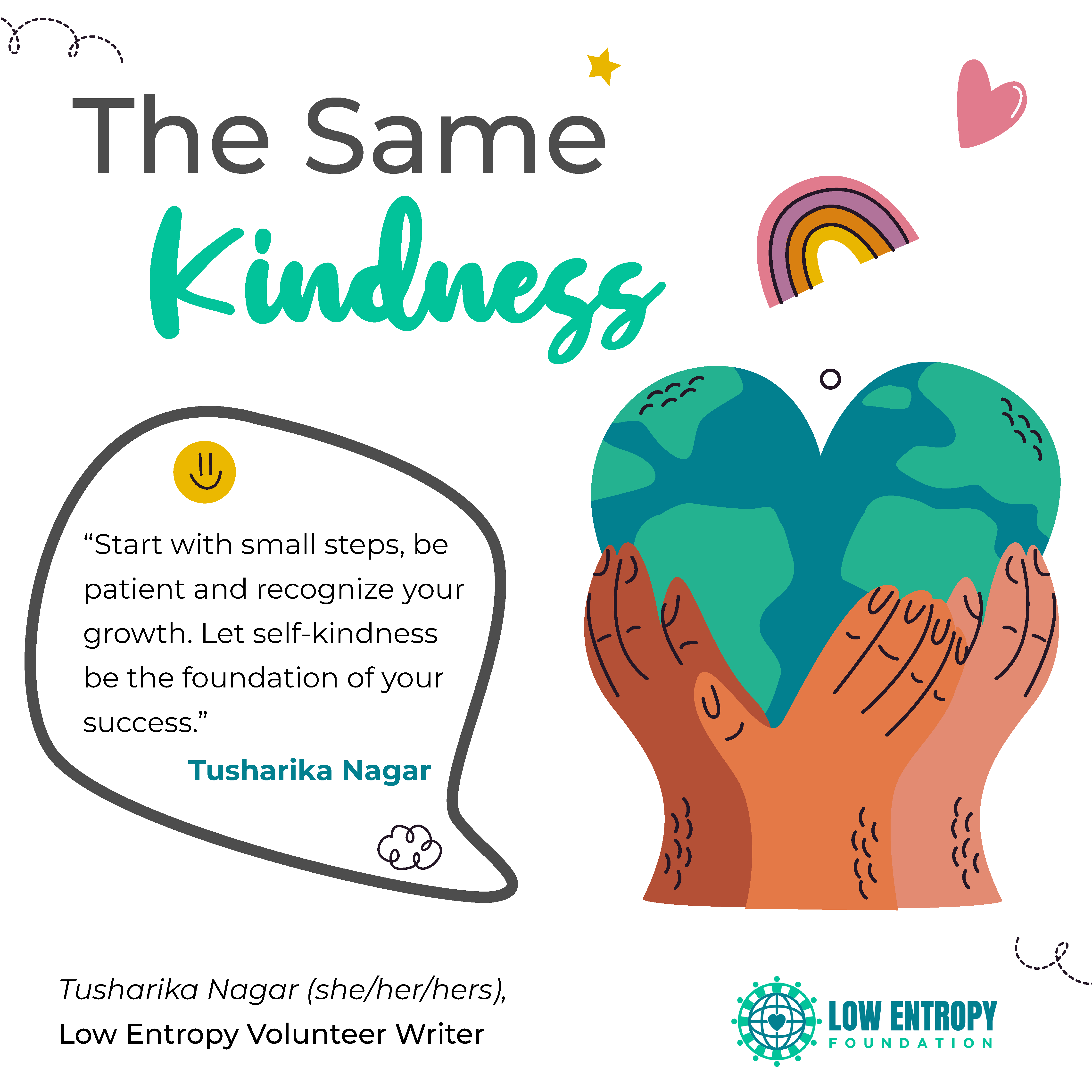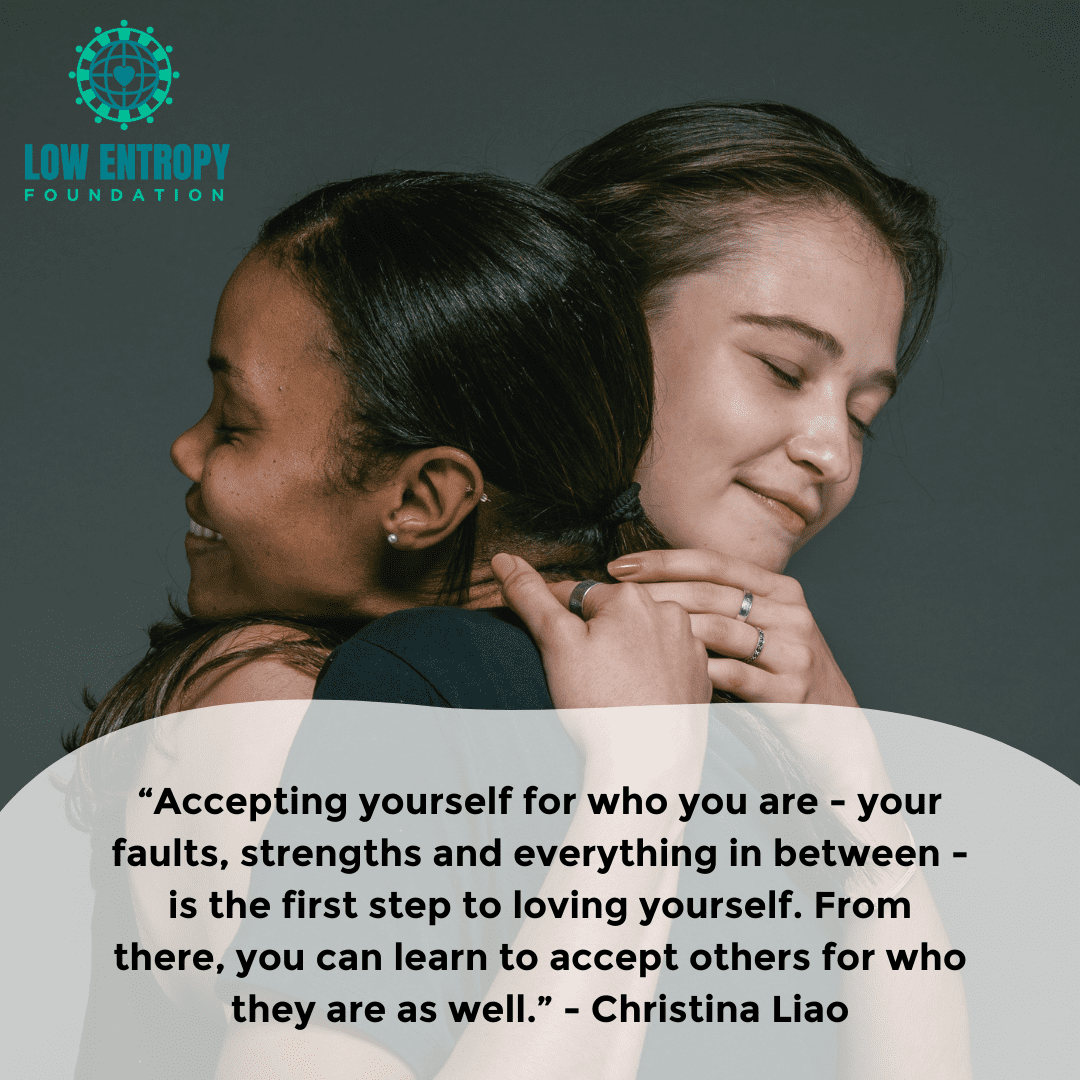The Same Kindness
January 8, 2024

Tusharika Nagar (she/her/hers), Low Entropy Volunteer Writer
Have you ever wondered how some people seem to navigate life’s ups and downs with grace and resilience? The secret may lie not just in what they do, but in how they talk to themselves. Welcome to the world of self-compassion, a powerful, yet often overlooked tool in your personal development arsenal. It’s not about self-indulgence or ignoring your flaws; it’s about recognizing that being kind to yourself is a cornerstone of strength and success. In this journey, we’ll explore how cultivating self-compassion can transform how you view yourself and achieve in every aspect of your life. Let’s debunk myths, discover strategies and unlock the transformative power of treating yourself with the same kindness you offer to others.
UNDERSTANDING SELF-COMPASSION
At its core, self-compassion involves treating yourself with the same kindness, concern and support you’d offer a good friend. Developed by Dr. Kristin Neff, this concept breaks down into three vital components: self-kindness, common humanity and mindfulness. Self-kindness means being gentle with yourself rather than harshly critical. Common humanity connects your experiences to the broader human experience, reminding you that you’re not alone in your struggles. Mindfulness allows you to be present with your feelings without over-identifying with them. Contrary to common misconceptions, self-compassion is not about self-pity or weakness; it’s about acknowledging your humanity and your potential. By embracing these elements, you begin to see that self-compassion is not just feel-good navel-gazing; it’s a practical approach to nurturing your mental, emotional and even professional well-being.
THE ROLE OF SELF-COMPASSION IN PERSONAL TRANSFORMATION
Imagine self-compassion as a catalyst in the chemistry of your personal growth. A remarkable shift happens when you start treating yourself with kindness and understanding. You move from being your own harshest critic to your most supportive ally. This shift is crucial in how you face life’s challenges and setbacks. It’s not about avoiding or sugarcoating difficulties; it’s about approaching them with a forgiving and constructive mindset, rather than a punitive one. This transformation in your inner dialogue fosters resilience, enabling you to bounce back more effectively from failures and pursue your goals with renewed vigor. Moreover, self-compassion opens the door to greater emotional intelligence and empathy, enriching your relationships with others.
SELF-COMPASSION TECHNIQUES FOR DAILY PRACTICE
Integrating self-compassion into your daily life doesn’t have to be an overwhelming task. Here are some simple, yet effective practices to help you cultivate this vital skill:
- Mindfulness Meditation: Start with just a few minutes a day. Focus on your breath and observe your thoughts and feelings without judgment. This practice helps you become more aware of your inner dialogue, allowing you to steer it towards kindness.
- Positive Self-Talk: Pay attention to how you talk to yourself, especially during challenging times. Replace critical or negative thoughts with compassionate and affirming ones. Remember, the words you use with yourself matter.
- Gratitude Journaling: Write down three things you appreciate about yourself each day. This practice shifts your focus from what you think you lack to the abundance of qualities you possess.
- Self-Care Rituals: Whether it’s a relaxing bath, a leisurely walk or reading a book, find activities that nourish your body and soul. Self-care is a testament to self-respect and compassion.
- Forgiveness Exercises: Learn to forgive yourself for past mistakes. Holding onto self-blame hinders growth; releasing it paves the way for learning and moving forward.
SUCCESS STORIES: SELF-COMPASSION IN ACTION
Let’s explore some success stories to bring the power of self-compassion to life. These are not just tales of triumph, but also transformation through the lens of self-compassion.
- The Executive Who Learned to Embrace Failure: Meet Alex, a high-powered executive who struggled with perfectionism. After embracing self-compassion, Alex learned to see failures as stepping stones rather than setbacks. This shift reduced stress and sparked innovation and creativity in their team.
- The Artist Who Found Her Voice: Maria, an artist, often battled with self-doubt. Through practicing self-compassion, she learned to quiet her inner critic and trust her creative instincts. This newfound confidence led to a breakthrough exhibition and critical acclaim.
- The Student Who Overcame Anxiety: Robert, a college student, faced overwhelming anxiety about his future. By adopting self-compassion techniques, he began approaching his fears with understanding and patience, leading to improved academic performance and a more balanced life.
HOW TO OVERCOME THE BARRIERS TO SELF-KINDNESS?
While the journey to self-compassion can be transformative, it’s not without its challenges. Here are some common barriers and how you can overcome them:
- The Misconception of Self-Indulgence: Many fear that self-compassion is a form of self-pity or laziness. However, it’s about acknowledging your struggles without judgment and motivating yourself to overcome them. Recognize that self-compassion is a form of self-respect, not self-indulgence.
- The Habit of Self-Criticism: Breaking the habit of self-criticism requires conscious effort. Start by noticing when you’re being self-critical and actively replace those thoughts with kinder, more constructive ones. This shift doesn’t happen overnight, but it becomes more natural with practice.
- Fear of Vulnerability: Embracing self-compassion means being vulnerable with yourself, which can be daunting. Remember that vulnerability is a strength, not a weakness. It’s about being honest with yourself and acknowledging your needs and limitations.
- Cultural and Societal Influences: Sometimes, societal norms discourage expressing self-compassion, equating it with weakness. Challenge these norms by reminding yourself that self-compassion is a source of inner strength and resilience.
EMBRACE SELF-KINDNESS FOR LASTING SUCCESS
In exploring the transformative power of self-compassion, we find it’s not just a feel-good concept, but a catalyst for real achievement. Understanding and practicing self-compassion paves the way to a resilient, fulfilling life. Remember, this journey is continuous and deeply personal. Start with small steps, be patient and recognize your growth. Let self-kindness be the foundation of your success. As you transform your life with compassion, you contribute to a kinder, more empathetic world. Begin today, and watch how this powerful change unfolds within and around you.
—
Tusharika is a seasoned writer with a profound passion for mental and emotional wellness. She advocates for a society where achievements and good mental health go hand in hand. With a bachelor’s in architecture followed by top MBA honors and styling expertise from NYC’s Fashion Institute of Technology, Tusharika finds solace in the mystique of Tarot cards and the healing power of spirituality. She crafts poetry or watches period dramas from her four-poster in her free time.
GET INVOLVED
At Low Entropy, we believe changing the world starts with changing ourselves.
Founded in 2015, Low Entropy Facilitates conversations that encourage diversity and promote inclusivity.
We understand that life can be confusing at times. It can seem challenging and sometimes you may feel like no one really “gets you.” We offer an opportunity to connect with others who have the capacity to understand you.









